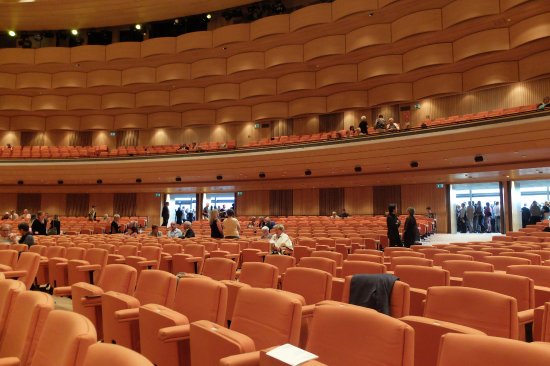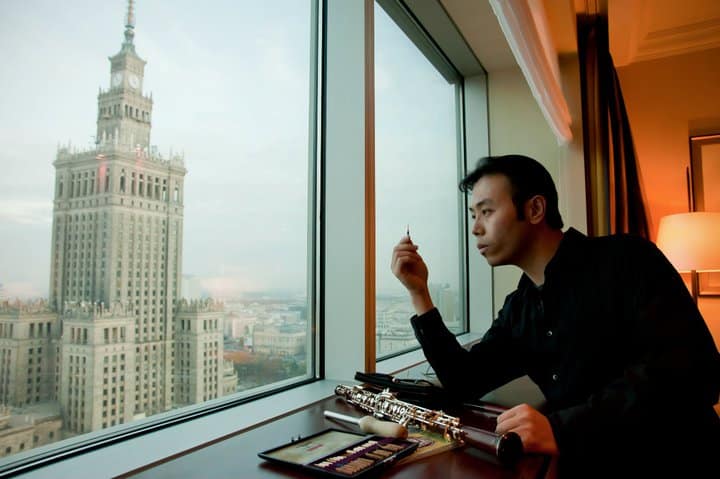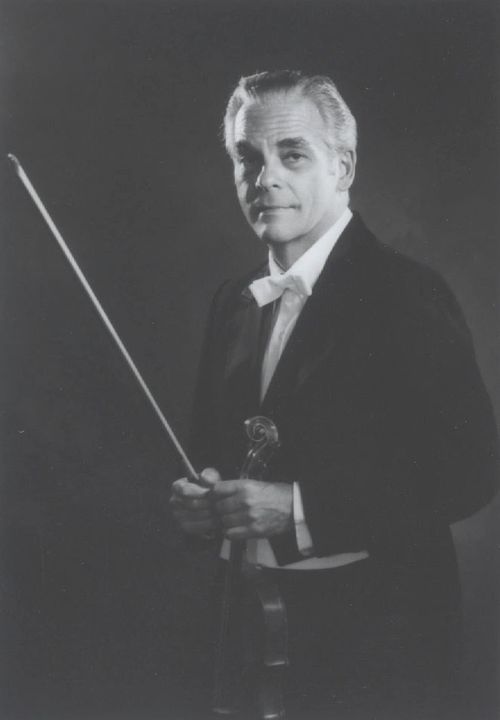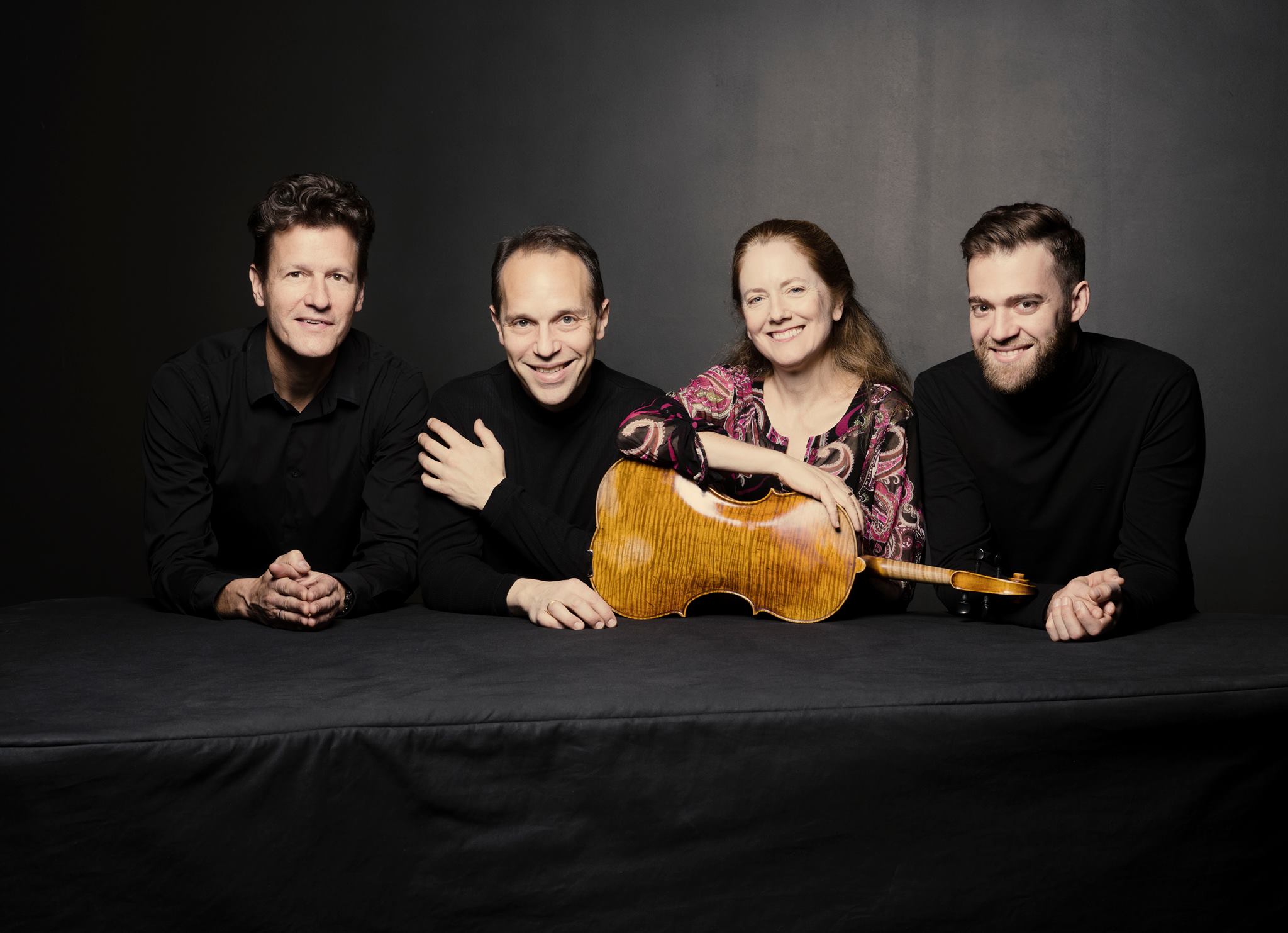Are you ready for a year of Bruckner?
OrchestrasFrom my monthly essay in The Critic:
This is a warning of heavy weather ahead. Next year marks the bicentenary of the birth of Anton Bruckner with incoming gales of his symphonies, nine of them numbered and two marked “0” and “00”. To add to the confusion, the symphonies exist in as many as nine different editions made by misguided fans and headstrong conductors.
The real Bruckner is not easily identified. The acidulous conductor Hans von Bülow called him “half simpleton, half genius”, which is not far from the truth. Johannes Brahms dismissed his works as “symphonic boa constrictors”. The Vienna critic Eduard Hanslick put down his eighth symphony as a “nightmarish caterwauling”. The British wit Thomas Beecham “noted six pregnancies and at least four miscarriages” in another symphony. It was all too easy to kick a composer who was shambolic, inarticulate and pathetically vulnerable….
Read on here.
pictured: Brucknersaal, Linz






Indeed Bruckner is something like a ‘potato dumpling’, a quite big one, but the moments where he soars, invite for bearing the longeurs and dead episodes and clumsy scoring (like an organ). What is less known is that he began to write his symphonic boa constrictors after having a peculiar nervous breakdown, out of the blue, when he disappeared in the woods for days, and was found weeping at a brook. After a hospitalisation of some months he was on the rails again and knew he had to write down something that came from ‘the other world’. Surely he had been visited by something, comparable to certain passages in the bible. But this is so rare and strange that it got underestimated by most biographers.
It’s nice to see you back John! I can’t wait for 2025 (a Boulez centenary).
Hope Sally is well and not giving you a hard time!
Heaven help us!
It will – that’s why it’s sending a year of boosted Bruckner ☺️
I look forward to that year with appropriate gloom….
I see him already walking around with a malevolent grin, rubbing his hands
Sally
Well said, John. I frankly love his work and compare it to the mental turmoil, passion , and anger of a Mahler. There is such a buffet of musical interpretations by some really renowned conductors that it makes one wonder if they truly can understand, interpret, and present his work. Some of the orchestral clumsiness adds to struggle of life and mind illistrated through the beauty of a musical pen.
The picture you showed at the head of your post shows a concert hall with all the seats empty. How apt. It symbolizes my feeling about all of Bruckners symphonies.
I’ve tried and tried with Bruckner and Mahler and have always given up through sheer boredom. I need the musical narrative, the long line which moves from A to Z – coherently – and have found none of that in those two composers. Just a lot of loud noise, full of sound and fury, signifying nothing.
It´s music for grown ups. And if there ever was a composer of the long line,it´s Bruckner. mahler has elements of empty bombast,especially in the wrong hands of some conductors.Bruckner? never!!!!
If you can’t even see it in Mahler, that’s a you problem. Bruckner is difficult. I also don’t get it yet. Mahler is much more coherent music.
“…the longeurs and dead episodes and clumsy scoring…” – does not sound like the comment by someone who has spent much time with the scores. And it certainly seems odd that so many of the greatest conductors performed this music, if it were actually written the way you referred to it. “clumsy” and “dead” may be more descriptive of your reaction to these symphonies.
‘Clumsy’ in the sense of: scoring as if playing the organ, with blocks of textures like organ registers, no organic mixtures of the endless possibilities as all the other 19C composers did. It is a very simplistic approach. – ‘Dead episodes’: the stretches where he merely fumbles-on without ideas, which contrast so strongly with the inspired bits. These are mere observations of what is there, not subjective reactions. Anybody can hear it, see it in the scores.
You have been fumbling on without ideas for decades.So what?
That’s what I say regularly, in vain
Sally
Umm, I think he was just bummed that he couldn’t hook up with teenager girls. Guy was a disgusting old man his entire life. Love the symphonies though.
Apt username
When it comes to making pronouncements on the perceived qualities or shortcomings of Bruckner symphonies, quite apart from my own views (I have conducted some of his music), I am more inclined to follow the opinions of… let’s see… Bruno Walter, Otto Klemperer, William Steinberg, George Szell, Eugene Ormandy, … or – to name a contemporary – Ivan Fischer. Not to mention Furtwängler, Jochum, Giulini, Kubelik, Skrowaczewski… Those who don’t care for this music are under no compunction to listen to it. And yes, it is possible to love these symphonies AND the symphonies of Mahler, with equal passion…
And I prefer to follow the opinion of Brahms.
Composers opinions on other composers are not known for their wisdom… esp. Johannes, who had little good to say of any living composer. Might I ask what Brahms comment exactly (source please) you are referring to?
By the way, the political background does also have some bearing on Brahms’ negative opinion. Brahms was part of the liberal, haute-bourgeoisie circles in Vienna, who fiercely rejected antisemitism and rightwing nationalism (the Bildungsbürger). But Bruckner was put forward by groups that were antisemitic, and sported Wagnerian antisemitism and nationalism. So, understandably, Brahms looked to anything coming from that direction with contempt. Also the lack of structural consistency and the squareness must have discouraged him to take Bruckner’s symphonies seriously.
To pick up the phrase “German soul” from the article, “German” and “Germanic” are not quite the same. Bruckner grew up and died in the Austro-Hungarian Empire, as did Dvorak (who outlived Bruckner) and Liszt before him. Does that make their music “Germanic” or “German”? I think not. In any case. the number of fine non-German conductors who have put their stamp on Bruckner’s music is testament to the fact that there is a universality to his music. Less German soul, please. It adds nothing to the quality of his music.
Correct.
But Bruckner’s music belongs to the ‘German tradition’ of which the best is thoroughly European and indeed, universal. ‘German’ in this context means: stemming from a cultural idea, born in a certain area but meant for everybody.
Germany, Austria, and German-speaking Switzerland are all defined as Germanic cultures. The cultural connections run deep.
I am neither German nor Germanic, neither Austro nor Hungarian, neither Catholic nor Christian, I like neither churches nor organs, Bruckner speaks to me on no level.
Bruckner is like Messiaen for me:
Fervent Catholic professional organists who express their personal religious ecstasy in their own private language.
Messiaen famously sees colors in his chords (good for him, I see sweating musicians), Bruckner envisions mountains in his blocs of music (good for him, I envision the end of the concert).
It´s music for grown ups with an attention span bigger than an insect´s.
Ironic, coming from “Dragonfly” XD
As a child, I came under the all-encompassing spell of Wagner, thanks to a live, internationally broadcast performance of the Ring from Bayreuth. I then discovered Bruckner (7th). It spoke to me in a similar way- lofty, noble, earthy, beautiful. Indeed, alternating ‘cathedrals’ or ‘mountain ranges’ of glorious sound. I knew nothing of Germanic/Austro ‘soul’; I knew only I’d been given almost as great a gift as Wagner. I still feel this way almost 60 years later.
Yes it’s the landscape…. I wonder how composers in Andorra deal with that, in the midst of the Pyrenees.
If you compiled all the highlights from his 9 symphonies, then you get about 45 minutes of a good symphony.
It’d be something like Maazel’s Wagner Ring Without Words: a Bruckner Symphony Without The Boring Parts.
“When the legend becomes fact print the legend”. If I want ‘legends’ I’ll go for John Ford.
Except that, if you recall The Man Who Shot Liberty Valance, from which this quote is, Ford actually shows not only the legend, but also how things really happened. The spectator knows that it was Tom Doniphon, played by John Wayne, and not Ransom Stoddard (James Stewart) who shot Liberty Valance (Lee Marvin at his most vicious.)
Please spare us of this nonsense.
Love number 9.
Why all the whinging?
NL’s article is certainly respectful even if it seems to me he’s not on a position to properly explain Bruckner’s music with the insight of someone who is convinced by it. Here is a very different take on it (scroll below the lengthy introduction for the article, “Bruckner 101: Bruckner For Nonbelievers”).
https://www.classical-scene.com/2017/04/06/bruckner-lofty/
And when I want a really good laugh, I always get great pleasure from re-reading Jessica Duchen’s take on Bruckner, “Anton Bruckner Makes Me Lose The Will To Live.”
https://www.independent.co.uk/arts-entertainment/classical/features/anton-bruckner-makes-me-lose-the-will-to-live-7621907.html
I fully agree with Jessica! Some years ago I was taken to a performance of nr 6 and had the eery experience of “once you’re in one, you can’t get out again” – I had to be carried out of the hall on a stretcher straight to the St George’s Mental Health hospital where I had to be treated for 2 1/2 weeks to get out of that symphony again.
Sally
Are you sure it wasn’t Oz, Sally?
One of my favourite composers. I hope we get to hear many of his other works other than the symphonies. Organ music, motets, 3 masses and þhe Te Deum, chamber works. The symphonies came late. Sky Arts is currehtly screening a cycle of the symphonies. I hope the BBC Proms schedules a few symphonies and many of his other works.
At the very top of my lifetime concert-going was Bruckner Eight conducted by Karajan. A few years ago I told an intermission-acquaintance this, and he became tongue-tied with astonishment. I suspect he thought I was fibbing an ultimate one-up–but no, after five decades that evening still uniquely resonates for me.
When I heard Thielemann conduct the work earlier this year (different orchestra) it was like a grand double exposure. (Well, that’s the best metaphor I can come up with.)
I was still in college. December 1974. Boston Symphony Orchestra. Klaus Tennstedt in his debut performances in the USA. Bruckner 8th. My first live Bruckner. Not a bad way to begin a love for the 8th.
An excellent conductor!!
Yes! I assume you are in NY – I was at both HVK’s Bruckner 8 with the VPO in (I think) 1989 and Thielemann’s performance last year (same orchestra – VPO – better horn playing for T). This latter performance brought back memories of the former which John Rockwell reviewed by stating “this was a concert to tell your grandchildren about………………”
Geez, Norman, of course the criticism of the times is quite amusing and holds some truth; however we can’t deny the politics surrounding them. There is a lot of sublime music in Bruckner’s symphonies and I’m looking forward to hearing some live next year. I think Bruckner teaches us to listen differently, presenting a novel approach to musical time.
Maybe, but much of it is ‘cubist music’, big blocks put next to each other.
A brilliant epithet.
Parsifal: Vorspiel 1. Akt
Yes that is a comparable case…. and it is its weakness, I think, not a strength, from a composer priding himself on being a master of transition. After the first beautiful phrases the listener is suddenly put back into a village church to hear a primitive block of sermon.
“am I ready for a year of Bruckner”? Not whilst nailing my bollocks to a block of wood remains as a viable alternative.
Listening to Bruckner makes me want to nail someone else’s bollocks to a block of wood.
The CIA reportedly plays Bruckner in a loop at Guantanamo Bay during their waterboarding sessions.
As i said,it´s music for grown ups
It already is a loop.
In America, we definitely prefer Mahler over Bruckner by a large margin. Anton is a hard sell. Personally, there’s another Austrian composer whose 150th anniversary is next year: Franz Schmidt. There’s a composer who I wish would get much more exposure.
The Book of the Seven Seals!
Schmidt is championed by Fabio Luisi in Dallas; Das Buch mit sieben Siegeln there in March 2024.
Agreed. Fourth Symphony – great work of art and one of the finest works of the 20th century.
Probably true, yet every major U.S. orchestra generally does a Bruckner symphony every season, as they do with Mahler. And they don’t generally go through all nine as they do with Mahler; #1s and 2 don’t get out much.
There are indeed, occasionally, strangely disappointing moments in his music in which he seems to have lost his true inspiration. But his is a very unique musical language — there’s no way to mistake him for another composer. I came across his piano works recently and they are extremely conventional, even playful — nothing like the seriousness and grandeur of his symphonic work. I believe Bruckner is the prime example of the late bloomer, of the one who finds himself only much later in life and still able to deliver a monumental output in terms of its musical significance.
One of his somewhat neglected works, which I personally would have to take with me on a desert island, is the Mass no. 3 in F Minor — an absolutely sublime work that to me equals what only a composer such as Bach can often do. I highly recommend the documentary on Celibidache’s rehearsing it, and of course his own recording. Here are a few links for those who might be interested, including a great performance with Janssons and the BRSO.
https://www.youtube.com/watch?v=T8vlkk2j6gw
https://www.amazon.com/Celibidache-St-Florian-Bruckners-minor/dp/B00D6GAJEM/ref=sr_1_34?crid=172FJGJ5MUXRN&keywords=celibidache+bruckner&qid=1701618567&s=movies-tv&sprefix=celibidache+bruckner%2Cmovies-tv%2C99&sr=1-34
https://www.youtube.com/watch?v=KkAjo_il_Ss
With his music, this means something different:
“A year of Bruckner’s symphonies is not long enough.”
I love Bruckner, but perhaps a comparison to the novelist Theodore Dreiser is not amiss. Dreiser wrote poor sentences but towering novels…
Or the windbag Oscar Wilde.
There´s always Rosamunde Pilcher for you…..
Many of the same complaints were made of Mahler not that long ago.
Like my mom used to say, Bruckner is music for grown ups. It´s one of the supreme achievements in Western culture.
I think he’s for grown ups, but also for kids, and those in between. I’ve seen at both my own concerts and at concerts I attended children, young children who sat open-mouthed in awe at Bruckner’s music. His music is very profound, but I think for little ones it can appeal to the same side of them as say a Lord of the Rings movie does. Epic! It’s much like Wagner. When one is 6 one loves the massive brass and the dragons and swords and that’s just fine, great even. And then as one grows one discovers more and more layers to it. I still am! In both Wagner and Bruckner.
Yes!!!!!!
Bruckner just did his own thing, so many setbacks and he just kept going. One of my favourite recordings is Haitink’s first, late 60s recording of No 7.
Interesting fact, one the last concerts Bruckner attended had Till Eulenspiegel on the program!
He died very soon after that.
No!
Brahms was right.
There’s a big misunderstanding here. The “Bruckner Year” is just the performance of one Bruckner symphony by Sergiu Celibidache. That is, if he finishes on time.
Alas, Celi is, together with John Ogdon, busy preparing the Sorabji piano concerto. It will mark his triumphant return to the London Symphony Orchestra and his debut with Philharmonia, since the work requires the combined forces of all London orchestras and choirs, often playing one-a-part.
The performance will take place at Royal Albert Hall, which will be filled to the brim with performers. There will be no space for spectators, but the BBC will be there filming the performance, which will be broadcast.
There is truly no such thing as too much Bruckner. Music that opens up the heavens for us, and lets us discover ourselves and indeed our own eternity. Music that contains, like the Big Bang, every single ounce of matter that is needed for life, but never shoves it down our throats. We can be so creative as listeners with Bruckner. Can’t wait for more Bruckner programming!
Bruckner is like Marmite – you either love it or you don’t. As someone who grew up on it, it’s part of the canon like Beethoven, Brahms, Schubert, Mahler and Schoenberg.
Schönberg does not belong to that group.
He does.Borstlap doesn´t…Although it would made good music for hotel elevators.
There’s an elevator in a Houston hotel that plays Schönberg’s Wind Quintet in a loop, to prevent customers to make inappropriate comments to women. There is an extra button with which one can repeat the movement just heard. It has been observed that some businessmen go up and down in that elevator to get full enjoyment of the music.
Oh, how I have missed the meandering and tiresome musings of Boreslap in these comments.
Personally give me a year of Bruckner, rather than one minute of that pseudo-composer Mahler.
Or two minutes of Borstlap….
I say that on a regular basis, but nobody seems to listen!
Sally
Is there a pre echo of Vaughan Williams’ Tallis Fantasia in the adagio of the 9th?
Yes, it appears twice.
A year of Bruckner sounds great.
But I’ll note that, by one telling, Bruckner did finish his ninth symphony. One of his associates heard him play a complete rendition of the finale on the organ, including the all-important coda.
The ending is missing now because pages were lost or pilfered. But it was sketched out from beginning to end before he died.
Not every orchestra or conductor are equipped to handle the massive challenges of Bruckner. Chicago, Berlin and Vienna are certainly capable but there are many others. Most of the great Bruckner conductors have passed but there are a capable few still around. Symphonies 4-9 achieve greatness in the Romantic orchestral language. They are not similar to the symphonies of Mahler in any way other than length.
It’d be my worst nightmare: a year of Bruckner combined with, or followed by, a year of Bartók
Bartok yes terrible stuff. Bruckner ok his choral stuff.
If you count up all of Bruckner’s works, most are actually non symphonic. Te Deum, Masses, Requiem, Missa Solemnis, Motets, male choir works, mixed choir works, lieder, some piano pieces, Magnificat etc. Many of these are on the now recorded. Eg Lieder on Gramola label
Gunter Wand’s recording of Bruckner 8 with Munich Phil I think has the edge over his Berlin one. It is on Profil Hannsler. The Munich recordings were not released when he was alive as they competed with his Berlin ones.
Listen to this piano piece by Bruckner. He is not all brass bands folks. Most of his stuff is non-symphonic.
https://www.youtube.com/watch?v=fnxZLd30wQ8
Bruckner came from a devout Roman Catholic family that was habitually deferential to church and state authority. Brahms was a lapsed Lutheran, who read the Bible. Bruckner lacked the self confidence of a Beethoven, Felix Weingartner in his book on the symphony after Beethoven says he had his head in the text book ladle for too long. Bruckner had a school teacher mentality obsessed with gaining qualifications and certificates.
His symphonic output suffers from lack of variety, the same organ registration formula he uses can be somewhat weary some. I recall a concert in Belfast with the Ulster Orchestra two old women stormed out of the middle of the first movement of Bruckner 3, as they could not take the repeated motto being blasted at them. Bruckner 4 is an improvement, though movement 1 is the best part of it. He seems to wear himself out by the time of his Finales.
His fifth has quite a nice theme in the Adagio, the rest of it reminds me of a herd of Elephants. Bruckner 6 the cheeky one he calls it, is not significant, the 7th is a homage to Wagner but is not the usual brass band apart from the controversial clash of symbols depending on which edition is used. His 8th is probably his best overall completed, the unfinished 9th might have been had he not spent so much time rejigging his 8th.
His choral music, motets, Masses, Missa Solemnis, Requiem etc are very serviceable for practical uses. So too his chamber music, quintet, lieder and piano pieces. I see these are now recorded on the Gramola label.
It seems Novak overlooked most of Bruckner’s non symphonic output, as irrelevant, the new Bruckner edition is now addressing this.
The late Gunter Wand said Bruckner is the greatest symphonist after Beethoven. I was lucky to hear his Bruckner 8 in Munich before he took his flight to heaven.